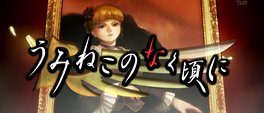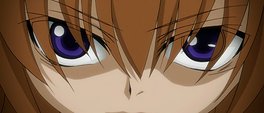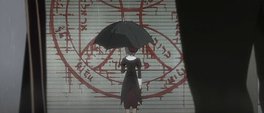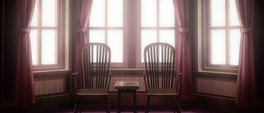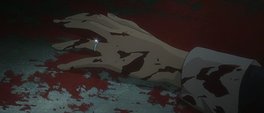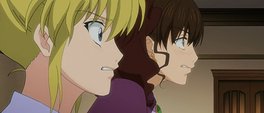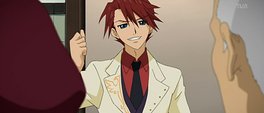So how are we going to follow Higurashi? We can't diverge too much from the formula otherwise people won't like it! What about if we set it on an island? And use a bunch of aristocrats instead of teenagers! We'll have to have some annoying teenagers in there somewhere. And a creepy child! But keeping with the murder theme? We'll use a witch this time, totally different from the demon we had scuttling about in Higurashi...
And so the first three episodes of Umineko naku koro ni unfold in a similar but no less enticing way than its predecessor, Higurashi no naku koro ni. Building on the success of its forerunner, Umineko continues the same malevolent and supernatural atmosphere while subtly twisting it into its own beast. With nary a reset in sight, the nouveau rich are bumped off with surprising speed until only a select few are left to solve the mystery of whether a witch is to blame (similar in nature to when wizards do it) or whether one of their own is taking up finger painting with other people's blood. The switch from a remote village to a closed-off island serves the same isolating purpose but opens up the alluring possibility of using the island itself as an antagonist rather than simply letting the box of scorpions scenario play out; likewise the shift from village dwellers to an affluent family keeps the paranoia and tension running thick. Indeed, the story revealed in the first episodes of Umineko is just as captivating as the first arc of Higurashi.
That is not to say that the series is flawless: even in early scenes, Studio Deen's propensity for near static compositions is telling and the likelihood of characters losing their bone structures later in the series, through no fault of the witch, is high. Even the facial distortions by the needlessly obtuse child or the overwrought mother show little inspiration and a lot of corner cutting. It's odd then that when it comes to backgrounds, there is such detail on display with sanguine symbols plastered on walls or crimson hand prints on doors, even rain soaked roses and night time gazebos are shown care and attention which makes the characters all the more jarring. There is little else in the production to find fault with, the opening and ending credits are grandiose but oddly fitting while the voice actors are given all the material they need to be almost innocuous - only the interminably grating child (voiced by Yui Horie naturally) stands out for her insistence on emitting an infuriating noise at the slightest provocation.
It's difficult not to compare Higurashi and Umineko, although 07th Expansion seems content to bring this on themselves by duplicating more than just the majority of the series' title. Fundamentally the formula works: a slow burning mystery with internal drama and connotations of the otherworldly, Higurashi suffered because it stretched its concept too thinly, marring the reason it was so engaging. With luck Umineko won't make the same mistake. Foreseeing how the series will evolve is difficult, with an indeterminate amount of episodes, the possibility of a paradigm shift halfway through is still possible; however it would be a shame to lose the Cluedo-esque set up as in only three episodes it has proven to be so successful in building the desire to watch how the enigma unfolds.
